The Fluidity of Facts
Ian Barnard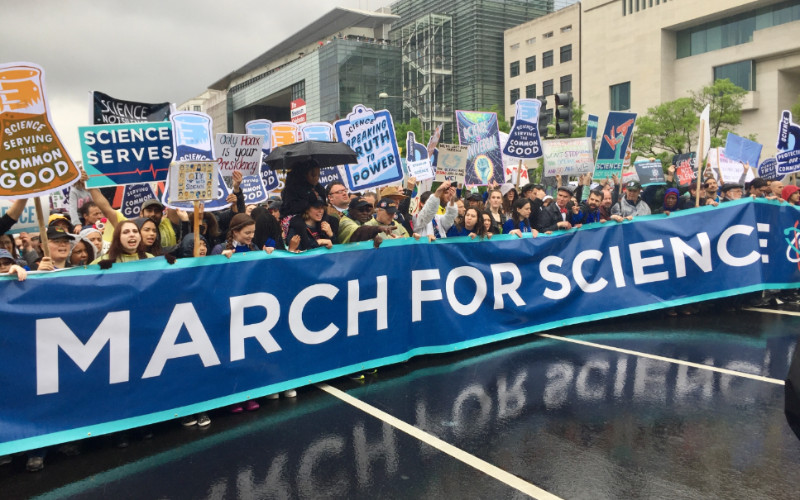
Sometimes we can disagree with the facts.
(Sean Spicer)
There are three kinds of lies: lies, damned lies, and statistics.
(commonly–falsely–attributed to Mark Twain)
Now we have learned that we must look to our own positioning, reassess how we are finding and viewing facts, be prepared to hear that facts do not come to us clean and fresh: “Against the positivism which stops before phenomena, saying ‘these are only facts,’ I should say: no, it is precisely facts that do not exist, only interpretations”
(James Kincaid 34, quoting Nietzsche)
I
From my title, you might suspect that I am in bed with Donald Trump and his cronies, but nothing could be further from the truth (and yuck, gross). In fact, part of my argument is precisely that the hard-won poststructuralist epistemologies that I and many others champion would be anathema to Trump and his ilk (assuming that Trump would be able to understand them in the first place).
But I’m getting ahead of myself. First, let’s recap some of the horrors of the US political landscape over the past two years:
During his presidential campaign and presidency, Trump effectively developed the mantra “fake news” to dismiss information that casts him in an unflattering light or with which he otherwise disagrees, no matter how credible, commonsensical, or well-informed this information might be. Trump’s pattern of behavior in this regard is probably partly attributable to 1) his psychological insecurity and his knowledge of how to generate attention and adulation and 2) knowledge gained from his experience in that most abysmal of television genres, reality TV, that must surely bear some of the blame for the situation the US currently finds itself in. We don’t know if he actually believes—or thinks he believes–the claims he makes. I say “effectively” in the opening sentence of this paragraph because this mantra has caught on, as has the discreditation strategy that it spearheads, and is now also being used ad nauseam by Trump’s surrogates and supporters (though, again, we don’t know the extent to which any actually believe what they are saying). This uptake of the phrase “fake news” and its corresponding dismissal of cherished institutions, practices, and values, including journalism, research, and other more dubious notions that I’ll get to in Part II below, has, understandably, terrified critics of Trump, since we envisage this dismissal of reality as possibly doing permanent damage to the reputation, resources, and functioning of the press, academia, and other critical bulwarks of democracy. Historians and others have noted the coincidence of the construction of “fake news” with the historical rise of fascism in Europe in the first half of the twentieth century (see, e.g., Ceallaigh, Yaeger). Kellyanne Conway’s much-mocked introduction of the phrase “alternate facts” into the political landscape in January 2017 added further consternation about the Trump administration’s disregard for truth.
Of course, the rhetorics of “fake news” and “alternative facts” have not gone unchallenged. Responses have included marches for science; robust calls for a return to facts in popular science and technology magazines (e.g., Apple, Thompson); an increased popularity of fact checkers and fact checking apps, websites, and news stories; and more. Neil deGrasse Tyson proposed the virtual country #Rationalia, whose one-line pro-science Constitution would demand, “All policy shall be based on the weight of evidence.” Even the arts have chimed in, with, for example, Los Angeles Times theatre critic Charles McNulty lamenting that both Trump and Chekhov’s Chebutykin “play fast and loose with reality” in a review article that used a who’s who of canonical playwrights and their characters to expose and comment on Trump’s crimes against decency and rationality.
Academia has not been left outside the fray. In March 2017, I received an email from the revered American Association of University Professors (AAUP) enjoining me, “Science Isn’t an Alternative Fact. Join Us in Protecting It.” My own field of rhetoric and composition studies has also come to the rescue of facts, spurring renewed interest in and attention to teaching students how to evaluate the credibility of sources. Indeed, in a recent Inside Higher Ed article, the Director of the University Writing Program at the University of Notre Dame boldly claimed that “the first-year writing class offers a robust defense against the post-truth culture and provides a model for constructive, fact-based public discourse” (Duffy). The pedagogical work in rhetoric and composition studies that offers an academic correlative to the marches and campaigns in support of science and facts has always been an important part of the teaching of college composition, since first-year college composition classrooms are often the place where students are taught how to engage professionally with scholarly (and other) sources in their own work. This work seems to have become more urgent of late. It is complemented by a long tradition of performing rhetorical analyses of “informational” texts of all kinds in composition classes, whether or not these texts will be used in students’ own compositions. Identifying and interrogating the strategies rhetors use to persuade and move their audience (the now canonical rhetorical triangle of ethos-pathos-logos, as well as other rhetorical maneuvers and impacts that have been erased in Western histories of rhetoric[1]) and the effects (whether intended or not) of various textual features on diverse audiences have long been seen as rhetoric’s crucial contributions to educating a citizenry who must be able to recognize how they are being manipulated if they are to assume their role as critical and active participants in a democratic sociality, and if they are to be able to resist these manipulations.
Our librarian colleagues have joined the struggle, amping up the workshops they’re offering to college students on discerning the quality of (especially online) news and other sources that they encounter in their everyday lives and will encounter in their academic careers, on sorting “facts” from “alternate facts.”
And reputable journalists and newspapers, who in the past might have prided themselves on a veneer of “objectivity” (a topic I’ll have more to say about below), have taken ethical stands against Trump’s epistemology and staked their claim in defense of “facts” (vide The Los Angeles Times announcing that “these are not normal times” upon inaugurating an anti-Trump editorial series titled “Enough is Enough”).
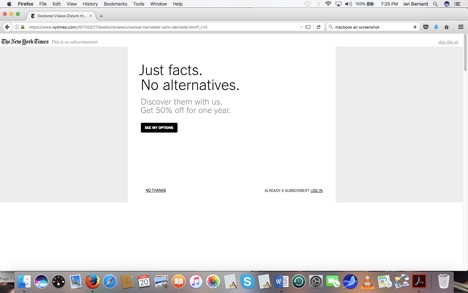
Screenshot from New York Times website, 20 March 2017
In the following section, I’ll explain my qualms about these understandable but misguided responses to Trump’s “war against facts.”
II
Whatever happened to the postmodern suspicion of “facts”? Have we abandoned the interrogation of scientific “objectivity” and Western universalism that revealed the very partial (in both senses of the word) underpinnings of such claims to objectivity and universality, and that fueled poststructuralism, ethnic studies, feminism, and queer theory in the second half of the twentieth century? What, specifically, is the relationship of rhetoric and composition, my own field, to these epistemological revolutions? And, crucially for our own times and for those of us who are teachers, how can we teach ethically in the age of Trump without at the same time colluding in propping up discredited notions of truth and questionable loyalties to facts, figures, and objectivity in order to contest the epistemologies advanced by the Trump apparatuses? These are the questions that will concern in me in this section and Part III.
The academic battles for multiculturalism in the US have largely been won (in theory, at least). Much of the evidence for the challenges to patriarchal monoculturalism was based on exhaustive and rigorous interrogations of traditional scholarly knowledge paradigms, the assumptions that informed these paradigms, and the rhetorical constructions by which these paradigms were disseminated. Previous claims of universalism and objectivity were revealed to be advancing very specific interests and agendas, whether consciously or unconsciously.[2] In academic literary studies in the US, for instance, the canon of “great” literature, the literature that was advanced as simply “the best,” was shown to be an ideological construction where value was based on invisible criteria that mystified the process of canonization. The idea that objective criteria had produced this apparently commonsensical list of masterworks was exposed: white Western men considered their values and experiences to be universal; everyone else’s were peripheral and particular. These critiques of dominant canons and methodologies, dominant versions of history, the versions of history that are presented in school textbooks, though well established by now, continue today.
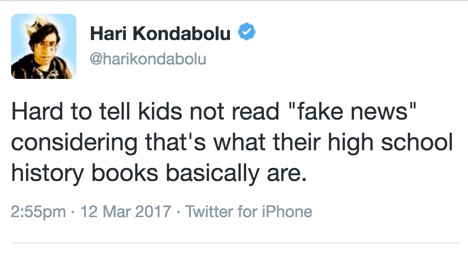
The sciences fared no better. Following international and national condemnations of 20th century “scientific” experiments in eugenics, and others that “proved” that black people had smaller brains than white people, that women had smaller brains than men, etc., non-scientists (and some scientists) woke up to the reality that scientists are no more able to step outside their own value systems than anyone else. Feminist critiques of science (e.g., Haraway, Harding, Spender) showed that what had been passed off as scientific objectivity was often a representation of the androcentric biases of male scientists. Even scientists themselves recognized that one generation’s scientific “fact” is the next generation’s fallacy (e.g., Kuhn). Plenty of terrible things have been done in and continue to be done in the name of science (Katz). Still today many scientists (and researchers in other fields) at universities across the globe are working on research funded by military and government organizations that makes the “objectivity” of their work suspect, and that increases the risk of their work being used in the service of war machines and imperialist enterprises. Academia has a shameful history of being co-opted by or colluding with repressive state apparatuses—vide the recent scandal in the US over the American Psychological Association’s collusion with the torture of prisoners in the “war on terror” (see Nashrulla, Risen). My point is that while this work is done in the name of “science,” it’s hardly unassailable and it’s hardly objective, and yet the very progressive constituencies that have been so critical of this work in the past are the ones now jumping on the defense-of-science-bandwagon. Hypocrisy much? Forgetting history? Or just panicked pragmatism? Thankfully, #Rationalia has been roundly critiqued (by both the Left and the Right) for abandoning questions of ethics and emotion to scientific technocrats (e.g., Guhin), but still the marches for science continue.
Progressive “anti-science” activists have played a crucial role not only in articulating science’s biases, but also in revolutionizing scientific practices and our dispositions toward science. In the 1980s and 1990s, for instance, ACT UP (the AIDS Coalition to Unleash Power) and other AIDS activists in the US exposed how the homophobia that researchers, drug companies, and government agencies had inherited from the larger dominant (heteronormative) society and a callously ignorant and prejudiced president Reagan was fatally inhibiting effective AIDS research, patient treatment, and drug development. In many cases, ACT UP members who had educated themselves on HIV, AIDS, and treatment and research protocols across the globe, knew more than the medical “experts” whose scholarly panels they interrupted and protested at AIDS conferences, and were ultimately consulted as experts on this research, and invited to join the conference panels and government agencies they had previously disrupted. ACT UP attacked the mystification of “expertise.” This activist work revolutionized many lay people’s relationship to medical experts and medical knowledge: no longer were patients to unquestioningly accept what their doctors told them, no longer was medical research seen as “objective.” Patients learnt to educate themselves on their medical issues, and to become their own advocates. The comfortable illusion of “expertise” was lost forever. Some cultural critics saw ACT UP as the first “postmodern” activist organization, given its media-savviness and attention to questions of representation. One of the group’s achievement was getting journalists, educators, politicians, and others to replace the agency-denying appellation “AIDS victim” with “PWA”–Person with AIDS.[3]
At the same time, in academia and the larger cultural landscape, poststructuralist theory and postmodernism were complementing the work of fields like disability studies, queer studies, feminism, postcolonial theory, and critical race studies by showing us how our understandings of reality are necessarily mediated through language, how available language determines what you can see and say in that language, and how the categories we use to demarcate historical periods and human (and non-human) classifications in fact create histories and subjects in their image.
So how did we get from this healthy skepticism of science, scientific methods, facts, and objectivity to the current state of affairs where the same social justice activists and intellectuals who had previously offered such withering critiques of the unquestioned obeisance to scientific “expertise” are now marching for science and acting as if “facts” are transparent and unproblematic? After all the work we have done to contest science’s hegemony, why would we suddenly want to ally ourselves with science? Did our skepticism change with our increased awareness of the frightening reality of climate change? Or are we just being driven by knee-jerk reactions against Trump, no matter how problematic these reactions may be? While specific individual scientists and purveyors of “facts” may certainly be ethical and even agents of progressive social change, we need to be critical about the institutions and epistemologies we are suddenly allying ourselves with, and the long-term consequences of this collaboration.
Strange bedfellows are increasing apace. How did progressives get to a place where, under the shadow of Trump, they were suddenly defending the FBI in the figure of James Comey, the very organization which they had previously indicted as the domestic enforcer of white supremacy and other social inequities in the US? And most of us have to admit, if reluctantly, that Trump was “correct” when he pointed out that the CIA lied when it assured the world that Iraq possessed weapons of mass destruction in order to justify the US invasion of Iraq in 2003. “Facts” can be used to make arguments that suit you as much as they can be used in the service of your adversary. This is one reason why we have to find a different ethos to rely on, something other than “facts.”
Now, you may be thinking, science is one thing, but facts are facts (e.g., no WMDs). Well, no. The facts you produce are necessarily shaped by the questions you ask and the investigations you undertake to produce those facts. And even then, facts don’t speak for themselves. They are necessarily articulated, interpreted, and mediated in a variety of ways. This isn’t a bad thing–it is what it is. However, liberal and even some radical intellectuals, politicians, and activists continue to peddle the sanctity of “facts,” as if facts can somehow be cordoned off from the contexts that produce, disseminate, interpret, and receive them. Diana Taylor, current President of the Modern Language Association of America (MLA), the world’s largest professional organization of scholars of literature and language, recently took a swipe at Trump in her President’s Column of the MLA Newsletter by opining that “Knowledge (as opposed to facts) is not out there in the world, ready to be found or measured or ingested. Knowing, like memory, like identity is a doing carried out in the present” (“Inside/Outside” 2, emphasis and parentheses in original). Taylor betrays her (newfound?) humanist allegiances in her parenthetical acquiescence in the distinction between what is “out there” and the interiority of our consciousnesses. I don’t deny that there may be something “out there,” but we can’t know that other than by processing it (or reports of it) through our consciousnesses. Taylor actually admits to the theoretical about-face of many progressive intellectuals that I have been chronicling in her latest MLA President’s Column, where she laments, “Our theories are being used against us. Those of us who had argued cogently that reality is complex and anything but natural and transparent are back in the trenches maintaining the primacy of facts” (“#States” 2). But capitulation isn’t the only route, as I will insist in Part III below.
We also need to recognize that the misguided insistence on “facts” as a counter-strategy to Trump and company’s cries of “fake news” has been spectacularly unsuccessful. Trump didn’t become US president based on his articulation of “facts,” and his supporters still don’t seem to care much about his ongoing “lies” (see Kolbert). This is where rhetoric’s work on pathos can help us to understand the variety of factors that affect people’s beliefs and actions, though, unfortunately, in the classroom teaching of rhetoric and composition we have focused too much on logos, without fully recognizing pathos’ widespread power and influence. I use “lies” in quotation marks as a way of hedging my bets, since it’s unclear to me whether Trump actually believes what he says or is intentionally lying (i.e., knowingly disseminating information that he believes to be untrue) in the hope that the lie will stick, or, at least, unsettle. The larger point, though, is that we may sincerely believe “fake facts.” During the infamous McMartin preschool child molestation trial in the 1980s, which resulted in no convictions and the suspicion that dozens of children were lying when they accused their teachers of sexual abuse, defendant Raymond Buckey stated that he thought the children themselves believed what they were saying (Kincaid, 345-46). Who is to say that any subject’s internal reality is truer, more authentic, more “real,” or more factual than external reality? If we can necessarily only apprehend reality in terms of our own experience of it, facticity itself becomes less stable.
So, yes, “facts” are fluid, but this doesn’t mean that anything goes, that relativism reigns supreme, and that intellectuals and activists need to abandon any quest for ethical thought and political action (an old and ill-informed critique of postmodernism and poststructuralism mounted by both the Right and vulgar Marxists on the Left[4]). How, then, can we teach/study/research/write/protest ethically in the age of Trump without at the same time colluding in propping up discredited notions of truth and questionable loyalties to science, facts, figures, and objectivity in order to contest the epistemologies advanced by the Trump apparatuses? It is to this dilemma that I turn in the last section.
III
The current sense of political crisis (especially in the US, but also elsewhere) has prompted many otherwise thoughtful intellectuals to panic, to abandon hard-won principles, to lash out. MLA President Taylor captures the sense of desperation in her reflection on Trump and company’s attacks on education and the humanities: “The speed and reach of the hostile actions set off alarms for those of us in the humanities. Gone was the time for analysis, reflection and discussion so vital to our understanding of critical thinking and decision making” (“#States” 2). It’s tempting to think that all opponents of Trump need to set aside our differences for now—temporarily, strategically—in the interests of presenting a unified opposition to Trump’s demagoguery. In the interests of unseating Trump as soon as possible. We’ve seen many Hillary Clinton supporters making the same kinds of arguments before the fateful presidential election day in 2016, and making it after to excoriate supporters of Bernie Sanders, Jill Stein, and other non-Clinton progressive alternatives to Trump. But this is a temptation we need to resist fiercely. To accede to it is to reproduce the binary thinking that underpins the hegemony of the two-party political system in the US and that enables neo-liberalism’s resilient hold on US politics. Republican vs. Democrat are presented as formative choices, when, in fact, the two are virtually indistinguishable on the grand political spectrum. But the illusion of real choice is precisely how corporate capitalism maintains its economic and political sway. Real choice is sidelined so that nothing really changes.
In composition studies, this type of binary thinking is manifested in those generic and persistent pro/con essay assignments that imply that there are only two positions on any given issue, and that the composer’s job is to come down on one or other side.[5] Not only do these types of assignment encourage bad writing, where nuance and complexity are sacrificed in the service of aligning every scrap of evidence up on the pro or con side of the debate (unless a particular evidential artifact is too messy, in which case it is usually conveniently ignored), but they also suppress ideas and ideologies that challenge and subvert the neo-liberal status quo. When, for example, we act as if the only two possible positions one can take in the debates over same-sex marriage are an anti-homophobic pro same-sex marriage position and a homophobic position against same-sex marriage, we silence the many radical queer voices who are critical of the fight for same-sex marriage on the grounds of marriage’s inscription as an institution into heteronormative, racist, capitalist, patriarchy (for one instance of such a critique, see Conrad). The same is true of facts. I refuse to back down in my fight against facts in the name of progressive unity as vigorously as I repudiate attempts to shame me by those who read my refusal as collaboration with Trump and Co. To claim or assume that there are only two positions on “facts” (pro or con, progressive or Trump) is precisely to enforce the manipulation of reality in the service of self-interest that the defenders of facts claim to be contesting!
But to entertain a poststructuralist skepticism of facts does not mean that we need to abandon our quests for social justice or our activism against Trump’s horrors. There are plenty of rhetorical choices for speaking and acting out against injustice, against misogyny, against racism, against environmental destruction, even, that don’t use facts as an easy crutch to avoid making the ethical and political case for why certain politics, policies, and executive practices are inhumane, discriminatory, destructive, self-serving, and wrong-headed. And I hope that those of us who teach composition and other subjects will make this case in our classrooms. Creative writing, composition, filmmaking, and other academic and creative fields, have been rendered irrelevant and toothless by their formalist emphases—or, at least, the perception by others of such an emphasis–, of the notion that they encourage students to say anything they want, as long as they say it well. As if content doesn’t matter. As if ethical and political concerns shouldn’t be at the heart of any university education.[6] Is it here, in offering our most passionate ethical (and, yes, political) arguments, that we can make our strongest and most well-rounded appeals to social subjects of all political persuasions, appeals that account for the value and power of pathos, ethos, and logos equally.[7]
Footnotes
[1] See Baca for one example of recent work contesting the Aristotelian rhetorical tradition, and the privileging of that tradition in the field of rhetoric and composition.
[2] For further discussion of these critiques of universalism and objectivity, see my Upsetting Composition Commonplaces, and Barnard and Osborn, “Epistemology Shock.”
[3] For a useful recent history of ACT UP, see the film United in Anger.
[4] See Lazare for an example of such a critique of poststructuralist composition theory–and of me, in particular.
[5] For further discussion of liberal pluralism and binary politics in US culture, see my “Civility and Liberal Pluralism.” For a critique of and alternative to the pro/con model of composition pedagogy, see McComiskey’s Teaching Composition as a Social Process. Ironically, McComiskey’s new book, Post-Truth Rhetoric and Composition, promises to reclaim and defend truth (as of this writing, the book has not yet been published—this promise comes from an amazon.com advertising blurb for the book), further evidence of my claim that erstwhile-critical scholars have run for the cover of “truth,” “science,” and “facts” in the wake of Trump.
[6] For further discussion of classroom politics, see my “Academic Freedom and Me.”
[7] I thank Jan Osborn for helping me to think through some of the ideas elaborated in this piece in an earlier collaborative article we wrote for The CEA Forum, Aneil Rallin for feeding me fuel for my fire on this topic and for feedback on an earlier draft of this article, and Alison Williams for inviting me to contribute to Anastamos.
Works Cited
Apple, Sam. “Waging War on Bad Science.” Wired, Feb. 2017, pp. 60-67.
Baca, Damián. Mestiz@ Scripts, Digital Migrations, and the Territories of Writing. Palgrave Macmillan, 2008.
Barnard, Ian. “Academic Freedom and Me.” Academe, July-August 2009, https://www.aaup.org/article/academic-freedom-and-me#.Wcc4g4przq0.
Barnard, Ian. “Civility and Liberal Pluralism.” symplokē, vol.13, nos. 1-2, 2005, pp. 134-43.
Barnard, Ian. Upsetting Composition Commonplaces. Utah State University P, 2014.
Barnard, Ian, and Jan Osborn. “Epistemology Shock: English Professors Confront Science.” The CEA Forum, Winter/Spring 2017 (forthcoming).
Ceallaigh, Philip Ó. “Fake News and the Rise of Fascism in the 1920s.” Literary Hub, 14 Sep. 2017, http://lithub.com/fake-news-and-the-rise-of-fascism-in-the-1920s/.
Conrad, Ryan, ed. Against Equality: Queer Critiques of Gay Marriage. Against Equality, 2010.
Duffy, John. “Post-Truth and First-Year Writing.” Inside Higher Ed, 8 May 2017, https://www.insidehighered.com/views/2017/05/08/first-year-writing-classes-can-teach-students-how-make-fact-based-arguments-essay.
Guhin, Jeffrey. “A Nation Ruled by Science is a Terrible Idea.” Slate, 5 July 2016, http://www.slate.com/articles/health_and_science/science/2016/07/neil_degrasse_tyson_wants_a_nation_ruled_by_evidence_but_evidence_explains.html.
Haraway, Donna. “Situated Knowledges: The Science Question in Feminism and the Privilege of Partial Perspective.” Feminist Studies, vol.14, no. 3, 1988, pp. 575- 99.
Harding, Sandra. The Science Question in Feminism. Cornell UP, 1986.
Harding, Sandra. Whose Science? Whose Knowledge?: Thinking From Women’s Lives. Cornell UP, 1991.
Katz, Yarden. “It’s Time to Take the ‘Great’ White Men of Science Off Their Pedestals.” The Guardian, 19 September 2017, https://www.theguardian.com/commentisfree/2017/sep/19/white-supremacist-statues-must-fall-scientists.
Kincaid, James R. Child-Loving: The Erotic Child and Victorian Culture. Routledge, 1992.
Kolbert, Elizabeth. “Why Facts Don’t Change Our Minds.” The New Yorker, 27 Feb. 2017, https://www.newyorker.com/magazine/2017/02/27/why-facts-dont-change-our-minds.
Kuhn, Thomas J. The Structure of Scientific Revolutions: 50th Anniversary Edition. University of Chicago P, 2012.
Lazere, Donald. Political Literacy in Composition and Rhetoric: Defending Academic Discourse Against Postmodern Pluralism. Southern Illinois UP, 2015.
McComiskey, Bruce. Post-Truth Rhetoric and Composition. Utah State UP, 2017.
McComiskey, Bruce. Teaching Composition as a Social Process. Utah State UP, 2000.
McNulty, Charles. “Embattled and Emboldened: Arts and Culture in the Age of Trump.” Los Angeles Times, 24 March 2017, http://www.latimes.com/entertainment/arts/la-ca-cm-mcnulty-notebook-20170324-story.html.
Nashrulla, Tasneem. “This is How Doctors and Psychologists Helped the CIA Torture and Interrogate Detainees.” BuzzFeed News, 10 Dec. 2014, https://www.buzzfeed.com/tasneemnashrulla/this-is-how-doctors-helped-the-cia-torture-and-interrogate-d?utm_term=.rpNqL55oPL#.qa2r6nn3O6.
Risen, James. “American Psychological Association Bolstered C.I.A. Torture Program, Report Says.” New York Times, 30 April 2015, https://www.nytimes.com/2015/05/01/us/report-says-american-psychological-association-collaborated-on-torture-justification.html?mcubz=1.
Spender, Dale. Man Made Language. 2nd ed., Routledge and Kegan Paul, 1985.
Taylor, Diana. “Inside/Outside: Un-disciplining Disciplines.” President’s Column. MLA Newsletter, vol. 49, no.1, 2017, pp. 2-3.
Taylor, Diana. “#States of Insecurity.” President’s Column. MLA Newsletter, vol. 49, no. 3, 2017, pp. 2-3.
Thompson, Clive. “The Social Medium is the Message.” Wired, Feb. 2017, pp. 56-59.
United in Anger: A History of ACT UP. Directed by Jim Hubbard, 2012.
Yaeger, Lynn. “What Fascism Can Teach Us About Donald Trump.” Vogue, 12 July 2017, https://www.vogue.com/article/donald-trump-fascism
Provenence: Invited submission.
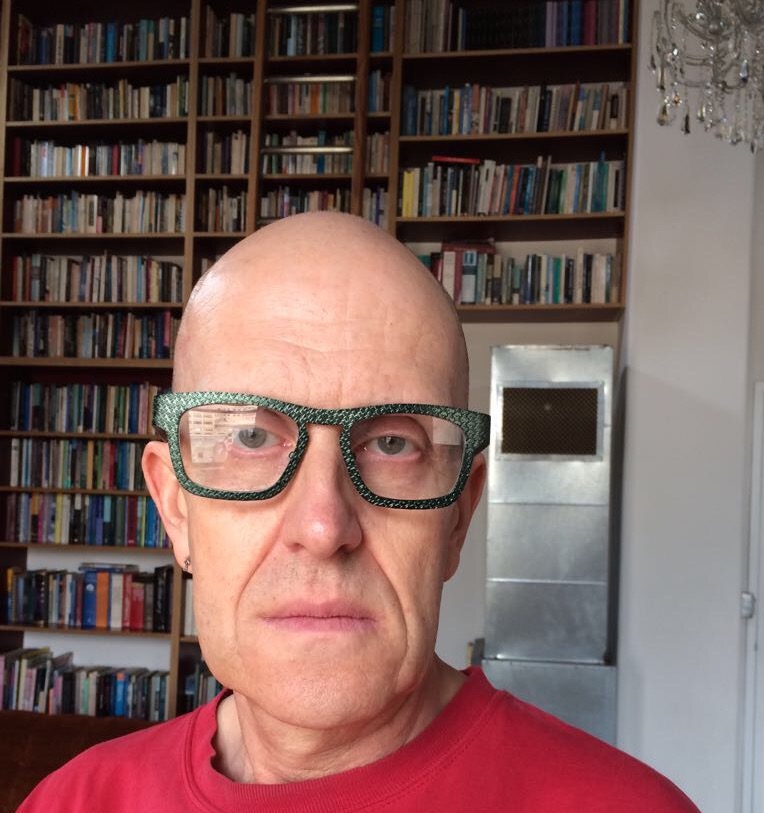 Ian Barnard is Professor of Rhetoric and Composition at Chapman University and author of the books Queer Race: Cultural Interventions in the Racial Politics of Queer Theory and Upsetting Composition Commonplaces.
Ian Barnard is Professor of Rhetoric and Composition at Chapman University and author of the books Queer Race: Cultural Interventions in the Racial Politics of Queer Theory and Upsetting Composition Commonplaces.
Featured Image: By Becker1999 from Grove City, OH – March for Science, Washington, DC, CC BY 2.0, https://commons.wikimedia.org/w/index.php?curid=58241634
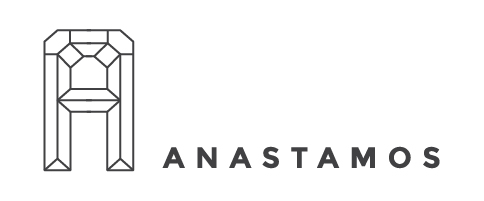

Kim Thompson Springville abused Jennie Barber
May 2, 2018 at 12:12 pmThe problem with these eppisodes in Pocatello and also across thhe country, is
that these charges typically cost citizens off time work
for either a visit to jail, or time fighting with thhe phony charges in court, and more frequently than not these
charges don’t carry any legal authority to
start with, but authorities have a golden ticket thqt they
are permitted to be ignorant oof the law, even despite the ignorance of the law is no excuse
for citizens.